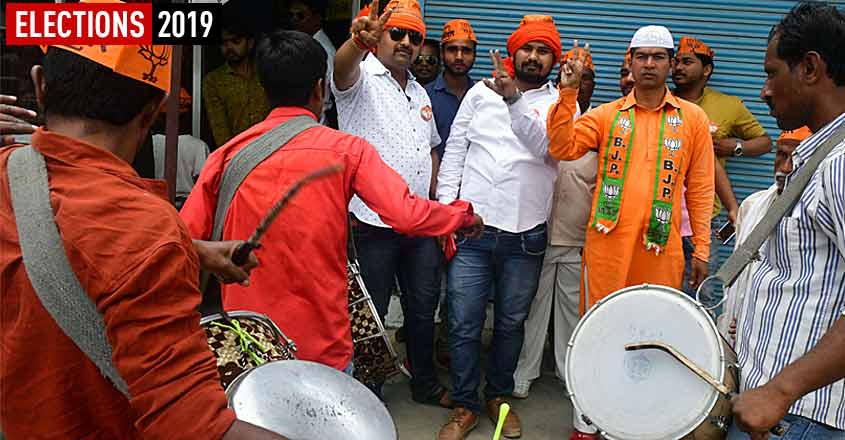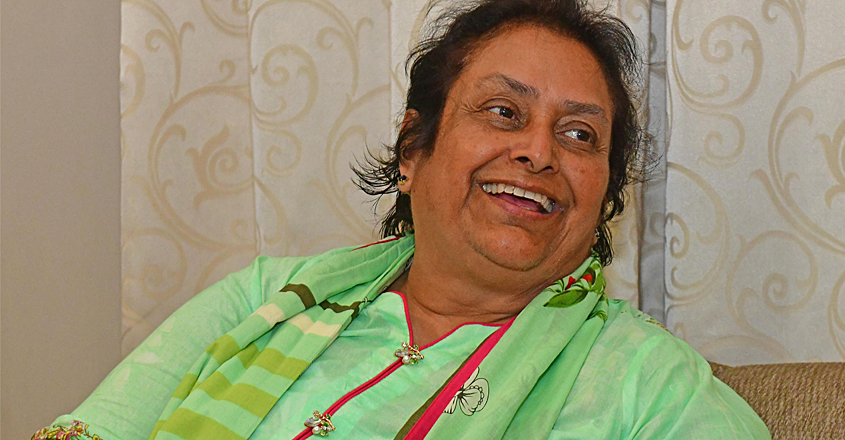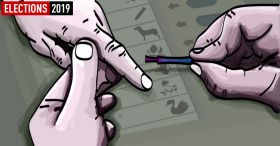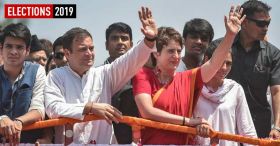
Samajwadi Party chairman Akhilesh Yadav has taken over the Azamgarh parliamentary seat from his father and party founder Mulayam Singh Yadav.
The younger Yadav was expected to contest from Kannauj, from where he made his electoral debut in 2000, but he chose Azamgarh instead.
The coalition the Samajwadi Party forged with Mayawati’s Bahujan Samaj Party and Ajit Singh’s Rashtriya Lok Dal is the greatest threat to the BJP’s hope to come back to power in 2019.
The Samajwadi Party draws its support from Yadavs and Muslims. Both the communities have a sizable say in Azamgarh and about 10 neighbouring constituencies including Khasipur, Jaunpur, Lalganj, Ambedkar Nagar, Sant Kabir Nagar and Deoria.
Akhilesh Yadav hopes to improve his party’s performance in these regions with his move.
We witnessed the BJP candidate’s road show in Azamgarh. Dinesh Lal Yadav is a local celebrity. He is a superstar in Bhojpuri movies and television. BJP workers waited for him to arrive, raising slogans and singing hit numbers from his movies. “The BJP won here in 2009,” a worker reminded me.
We then proceeded to the office of SP district president Havildar Yadav, who is in charge of Akhilesh Yadav’s campaign. Huge portraits of the party’s new leader and his wife hung over the walls, heralding the generational shift in the party.
We were led to Havildar Yadav’s house, which was surrounded by a mob of party supporters and many vehicles.
The party does not seem to be bothered about the BJP’s star power. “This is the constituency of Netaji (Mulayam Singh). We are only working to increase our lead.”
In Gorakhpur, we ran into a herd of cows returning to their stables as the day breaks. The city is named after the Baba Gorakhpur Temple, which is run by a mutt led by Yogi Adityanath, the BJP chief minister. “The cows take over the city at night,” my companion said.
I came across similar complaints throughout my travels through Uttar Pradesh. Panicked by the lynching of people who were suspected of transporting cattle, farmers kept their livestock at home. The starving creatures went out at night and rampaged the farms, forcing the farmers to keep night vigil to ward off the animals.
“The cow is an election issue,” my friend said. “The goshalas meant to protect stray cows are not functioning. The goshala near the Gorakhpur temple has a few cows to show. The rest of them are half-dead.”

The SP-BSP-RLD alliance was born in Gorakhpur. The BJP, which swept 71 of the 80 Lok Sabha seats in the state in 2014, lost the Gorakhpur byelection to the combined might of the opposition parties in 2018.
The rival-turned-partners decided to work together, but they dumped the Congress ahead of the general election.
That was before the entry of Priyanka Gandhi.
“Priyanka has revived the Congress,” said Talat Aziz, a prominent Congress leader in Gorakhpur.
“The minorities are hopeful. They are peeved with Mayawati for not working with the Congress.”
Aziz is an easily recognisable name across the state. Gunmen tried to shoot her 19 years ago when she was a member of the Samajwadi Party. The bullet missed her and killed her bodyguard. An accused in the case is the current chief minister, Yogi Adityanath. He was a young BJP MP then.
Asked whether the minority votes would be split with Priyanka Gandhi’s entry, she said: “That is not likely. Minorities always voted for the winning candidate. The Congress will win a few seats in eastern Uttar Pradesh.”
Gorakhpur has wider problems. About five lakh sugarcane farmers are in distress. Three of the five sugar mills have been shut. The mills still in operation refuse to buy sugarcane from the farmers. The farmers have not been paid for whatever they supplied in earlier years. The crisis is worse in western Uttar Pradesh, a hub of sugarcane farming in India. Farmers are awaiting payment of about Rs 10,000 crore.
Many of the sugarcane farmers are Jats, a community largely represented by the RLD, an alliance partner of the SP and the BSP.
When I set out from Kochi to tour east India, I had two Bengali labourers as my co-passengers on the flight to Kolkata. Shahin Alam and Prithvi have been working in a tea shop in Malappuram. They were part of a 10-member group of Bengalis going home from their place of work in Kerala. The Rapti Sagar Express from Gorakhpur to Thiruvananthapuram is always packed with youngsters in search of work.
The unemployment problem manifested in many other ways throughout the trip. A farmer I met in Varanasi had a telling problem to share. When the government doubled the minimum support price for crops, the cost of the seeds, fertilizers and electricity went up two and a half times. The farmers are forced to sell to middlemen at lower prices due to rampant corruption in the procurement centres.
While the people struggle to make both ends meet, political leaders are trying to address the problems with promises and slogans. They often forget that the voters are human beings. The seemingly silent masses of the Gangetic plains have often unleashed political storms.
The eastern winds are feared by the farmers for their power to spoil a good harvest.




